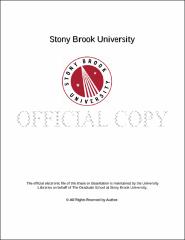| dc.identifier.uri | http://hdl.handle.net/11401/76757 | |
| dc.description.sponsorship | This work is sponsored by the Stony Brook University Graduate School in compliance with the requirements for completion of degree. | en_US |
| dc.format | Monograph | |
| dc.format.medium | Electronic Resource | en_US |
| dc.language.iso | en_US | |
| dc.publisher | The Graduate School, Stony Brook University: Stony Brook, NY. | |
| dc.type | Dissertation | |
| dcterms.abstract | Levels of partisanship and polarization within Congress are at high levels. However, this development defies the expectation of Downsian models. My dissertation attributes polarization to the activity of political donors. Using a database of over 13.5 million individual donors, I use advanced time series models to show that donors have been increasingly rewarding Republicans who toe the party line. In the second section of my dissertation, I explore how incumbent politicians may be using these campaign contributions to offset any potential electoral penalties for excessive partisanship. My examination of survey evidence shows that incumbents may be using campaign spending to reduce the ideological distance that voters perceive between themselves and incumbent politicians. The final section of my dissertation explores whether campaign contributions are decreasing the democratic responsiveness of legislators. I use polling data to generate state-level estimates of presidential approval. I then use these estimates to determine whether campaign contributions lower the responsiveness of legislators to public opinion. Overall, my dissertation shows that political donors are a key driver of congressional polarization. This development may have significant implications for the functioning of American democracy, as political donors may be making the political system less responsive the public. | |
| dcterms.available | 2017-09-20T16:51:08Z | |
| dcterms.contributor | Lebo, Matthew | en_US |
| dcterms.contributor | Segal, Jeffrey | en_US |
| dcterms.contributor | Peress, Michael | en_US |
| dcterms.contributor | Heerwig, Jennifer. | en_US |
| dcterms.creator | Stack, David | |
| dcterms.dateAccepted | 2017-09-20T16:51:08Z | |
| dcterms.dateSubmitted | 2017-09-20T16:51:08Z | |
| dcterms.description | Department of Political Science | en_US |
| dcterms.extent | 128 pg. | en_US |
| dcterms.format | Monograph | |
| dcterms.format | Application/PDF | en_US |
| dcterms.identifier | http://hdl.handle.net/11401/76757 | |
| dcterms.issued | 2016-12-01 | |
| dcterms.language | en_US | |
| dcterms.provenance | Made available in DSpace on 2017-09-20T16:51:08Z (GMT). No. of bitstreams: 1
Stack_grad.sunysb_0771E_12962.pdf: 814080 bytes, checksum: 135724a649b82fc347f3bb5c4066e17d (MD5)
Previous issue date: 1 | en |
| dcterms.publisher | The Graduate School, Stony Brook University: Stony Brook, NY. | |
| dcterms.subject | Political science | |
| dcterms.title | The Impact of Campaign Finance on Roll Call Behavior, Voter Perceptions, and Democratic Responsiveness | |
| dcterms.type | Dissertation | |

